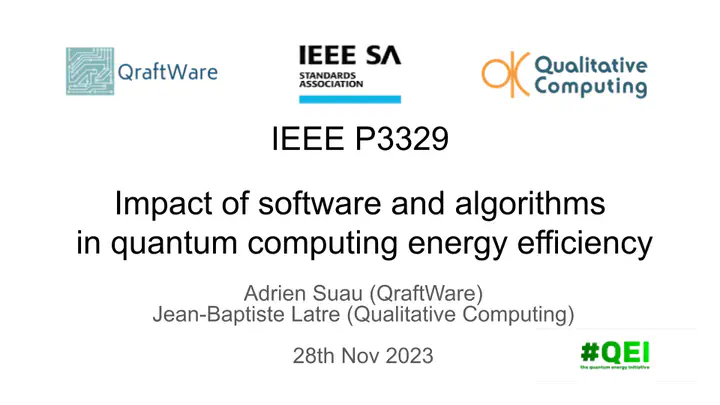IEEE P3329 Quantum Energy Initiative presentation
 Click on the “Slides” button above to get the slides
Click on the “Slides” button above to get the slidesA few preliminary notes on the talk:
- The logo used for the QraftWare company is temporary and will change soon.
- References to papers link to the last section of this page: Obtaining papers.
- The abstract can be found here.
Summary of the talk
The main supporting picture of the talk is the following:
- Modelling is the process of formulating a physical problem into a mathematical framework.
- Modelling is a crucial step in the problem-solving process and can have deep implications on the final performance of the implementation.
- Programming languages are a nice way we (humans) have to express a computation in a language that is made understandable to computers.
- Some programming languages are very close to the computer language (called low-level languages), and others are abstracting away a certain quantity of hardware subtleties (high-level languages).
- High-level languages are, from experimental research in the field of classical computing (see [1]), less efficient than low-level ones.
- Because current quantum computers are limited (in terms of number of qubits, coherence times, gate fidelity, …), low-level languages seem to be the most efficient way to go.
- In the distant future, when we will have hundreds of error-corrected qubits, a middle-ground between low-level and high-level languages will likely be the best choice.
Abstract
This talk is about challenges that arise higher in the quantum computing stack than hardware and that may severely impact the energetic efficiency of quantum chips if not considered. The efficiency of quantum computations relies on an appropriate co-design between hardware and software. While the effect of hardware on software is commonly admitted, a complete co-design approach is bidirectional. Therefore, one should also consider the influence of practical use cases and software on the hardware design.
Failing to do so may produce “efficient” hardware for which quantum algorithm implementation will have to be deeply changed and adapted to run, impacting the whole stack efficiency. Overall, the total cost of practical and explicit quantum algorithm implementation, taking into account qubit architecture, native gate conversion and algorithmic black-boxes (among other) can overweight theoretical speed-ups.
It is also enlightening to consider the impact of software in the energetic efficiency explaining why quantum computing is not ready yet for high level programming. Learning from classical computing, it turns out that higher-level programming languages can consume up to two order of magnitude more energy than their lower-level counter part. This ratio calls for an effort in making the hardware easily controllable by the programmer to avoid inefficiencies that can be up to several order of magnitude.
To be complete and even if it is a huge technical challenge, the global energetic efficiency of quantum computing should also take into account the associated cost of High Performance Computing (HPC).
Obtaining papers
- R. Pereira et al., “Ranking programming languages by energy efficiency”, Science of Computer Programming, vol. 205, p. 102609, 2021, doi:10.1016/j.scico.2021.102609.